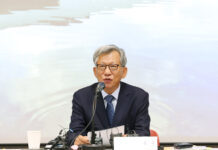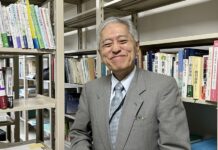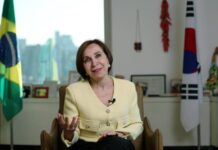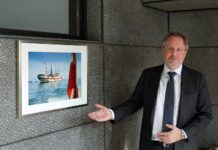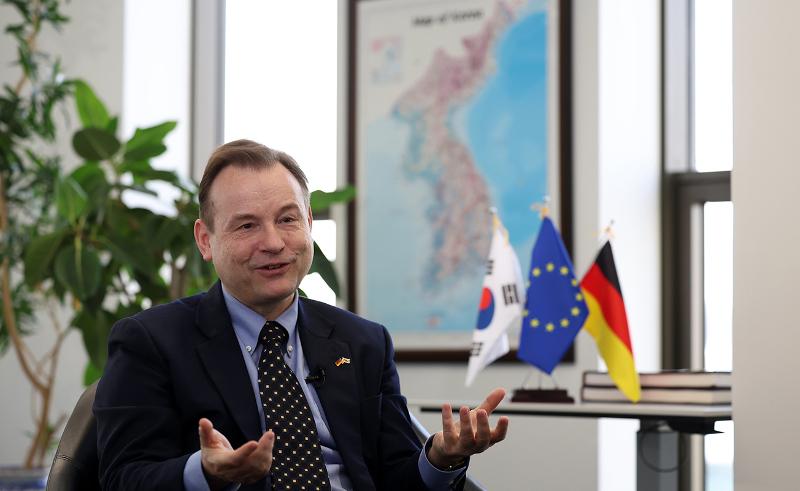
German Ambassador to Korea Georg Schmidt on Feb. 13 in an interview with Korea.net at the Germany Embassy in Seoul says bilateral cooperation in growth and the environment could lead to a second miracle on the Rhine River of Germany and Hangang River of Korea.
By Yoon Sojung, Yoon Seungjin and Lee Dasom
Photos = Jeon Han
Video = Jeon Han and Lee Jun Young
“Development that balances growth and the environment.”
This is what German Ambassador to Korea Georg Schmidt proposes as the direction of cooperation between Korea and Germany.
In an interview with Korea.net on Feb. 13 at the Germany Embassy in Seoul, he said both countries, which rebuilt themselves after World War II, can pull off a second miracle on the Rhine River of Germany and Hangang River of Korea through cooperation while balancing growth and the environment.
Assuming his post in October last year, the 140th anniversary of bilateral relations, the ambassador said he hopes to reach out more to the younger generation as well as residents of cities other than Seoul or the provinces to better understand Korean culture and history.
The following are excerpts from the Feb. 13 interview with Ambassador Schmidt at his embassy ahead of his first six months at his post.
The leaders of both countries held two summits last year on higher cooperation in several sectors. What progress has been made since their talks?
Since the two summits, we have already had two visits by our parliamentary state secretaries to Korea to discuss cooperation in science and technology, biotechnology and life science. The second visit was about high-tech cooperation, semiconductors and other sectors.
Because the climate issue is an important part of bilateral cooperation, we had a large hydrogen conference in Seoul, where more than 200 experts attended to discuss how Germany and Korea can exchange experiences, research and technology, and also (the latter’s) application and the potential benefits for our societies in going forward with energy transition. This is an important task for all countries because we must maintain the competitiveness of our countries while working toward energy transition for decarbonization as well. So we need a balance here.
In what sectors does Germany wish to expand cooperation with Korea?
Many people associate Germany only with big brand names like BMW. But the backbone of the German economy is Mittelstand, or small and medium enterprises (SME). Many such businesses in Germany are now well known because you cannot buy their goods as consumers, but you will find their products behind everything. Their technology is a very important part of the value chain.
Korea also has a strong manufacturing sector. If Mittelstand of Germany and SMEs in Korea work together, we can learn a lot from each other through more opportunities.
We also have a very strong cooperation between the people of both countries. When it comes to the diplomatic relationship between both countries, in the end, it’s all about human exchanges. Nowadays, young Germans study the Korean language and learn more about Korea and its culture. This goes beyond the traditional areas of cultural cooperation. For example, classical music in Germany is a well-established field for cultural exchange for Koreans. Now the opposite is going on, like growing German interest in Korean e-sports.
In your view, what is the key to boosting bilateral cultural exchange?
The Goethe-Institut, a German culture center in Seoul, offers opportunities and platforms of German culture to Koreans. The range of cultural exchange has gotten wider and the way of exchanges more diverse with more interaction. These days, it’s more about getting people to meet each other and then see what happens. Through various approaches and exchanges, they make something new. This is how creativity works. The role of the government is to offer platforms for them so that people can meet and have those experiences.
Korean miners and nurses are also another connection between both countries. Last year, we commemorated the 60th anniversary of the dispatch of Korea miners and nurses to Germany as well as the milestone of 140 years of diplomatic ties. Unlike today, things were very different back in 1963, not to mention no internet. Once something’s gone, it’s really gone. I salute the courage and determination of those miners and nurses who went to a country far, far away.
Although Germany society was very foreign to them, they learned the language and sent money back home to support their families and rebuilding of their country; they also supported the rebuilding of Germany after the war.
Some of their next generation decided to go back but others decided to make Germany their home. We are proud of them and treat them as part of German society. Korea is also proud of them. They belong to both societies. This is how diversity works in society, which enriches our societies.
Korea last year announced its support for construction of a memorial in Germany to German participation in the Korean War. How have both sides preserved the legacy of their solidarity that began with German medical aid during the conflict?
For Germany, 1950 came five years after World War II. The decision of the then German leader to send medical assistance was a huge step and showed solidarity. It was also an important political signal that Germany wanted to be firmly anchored in the West. So we decided to send help to a country under attack.
At that time, we had no army so we sent medical support to Korea. German medical personnel stayed in Busan, built a hospital, and spent many years there while training Korean medical staff and continuing people-to-people contact. Last year, a special gallery opened at the War Memorial of Korea in Seoul to honor German medical support during the war. We appreciate the opening of the gallery and hope that many people, including Germans, learn more about how German medical support during the war was part of the solid foundation of Korean-German cooperation.
How does Berlin see Seoul’s efforts to secure peace on the Korean Peninsula?
There are similarities in the division of Germany and that of the Korean Peninsula, but also important differences. Germany had no war between both sides. We weren’t hostile to each other. We weren’t threatened with nuclear weapons. Unlike separated families on the peninsula who hardly had any contact, we continued human contact for many years. German division wasn’t as harsh as Korea’s.
We always had a clear policy that we wouldn’t be intimidated but keep our doors open to dialogue. This important dialogue didn’t mean that I completely agreed with my counterpart but served as “diplomatic DNA” to talk even under the most difficult circumstances. This is also a signal from this government under the “audacious initiative” of President Yoon Suk Yeol.
What do you feel is the desirable direction of Korean-German cooperation?
After facing the challenge of war, both countries successfully rebuilt their economies by achieving the miracle of the Hangang and Rhine rivers. Now, the challenge of our societies is how to balance this growth and make sure that as many people as possible can share in the fruit of that growth.
Another task is to balance growth and the environment in economic development. We also have to make sure not to plunder Earth’s resources, something that will make the lives of the next generation very difficult. If we work together toward this end, we can achieve a second miracle on the Rhine and Hangang rivers. If we do, it could inspire other countries to follow.
You assumed your post in October last year. What do you hope to do while here?
Korean-German relations have prospered and a lot connects us after more than 140 years of bilateral relations. In addition to common political and economic goals that we’ve talked about, I want to stimulate discussions on topics tremendously affecting both of our societies like achieving sustainable and eco-friendly forms of living, making everybody part of our diverse societies, and seeing how immigration enriches as well as challenges and changes our societies. I want to reach out more to the younger generation, as well as people outside Seoul in other cities or the countryside.
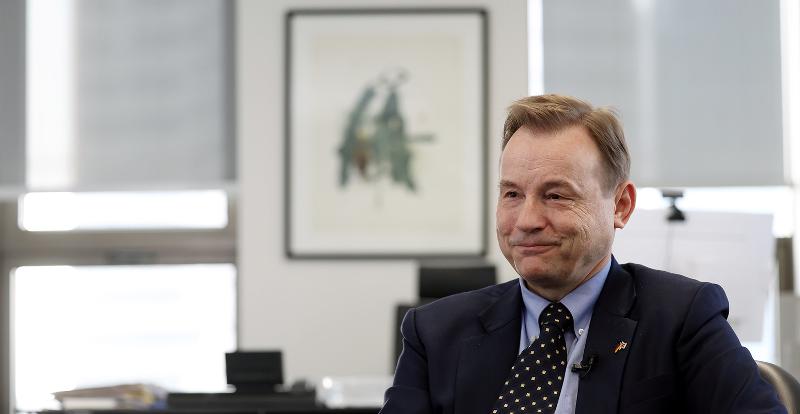
German Ambassador to Korea Georg Schmidt on Feb. 13 says that dialogue is especially important for peace on the Korean Peninsula and that President Yoon Suk Yeol’s “audacious initiative” contains the will to hold such talks.
arete@korea.kr


